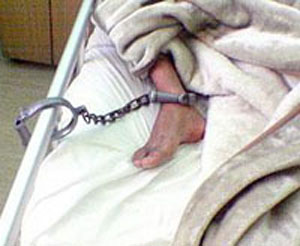In Nablus on Sunday, hundreds of Palestinians gathered for a peaceful march demanding justice for the prisoner Bassam al-Sayyeh, from Nablus, who died early Sunday in Israeli jail, due to medical negligence.
Participants in the march in the city of Nablus, which took place on Sunday evening, held the Israeli Prison Authority fully responsible for the martyrdom of Bassam al-Sayyeh.
During the march in Martyrs’ Square, the participants called for the need to stand by the prisoners and support their cause, especially sick prisoners who do not receive any care.
And they called on the regional coordination committee, to participate in the vigil against the practices of the occupation, tomorrow at noon in Martyrs’ square, also in response to what they called the unnecessary, negligent of Bassam al-Sayeh.
Al-Sayeh’s death came six weeks after the death of another prisoner, a Palestinian prisoner, Nasser Taqatqa, 31, from Beit Fajar near Bethlehem, who was found dead of acute pneumonia in an isolation cell in Nitzan Ramle detention center.
He had been held under Israeli interrogation since 19 June in Jalameh detention center, after he was arrested by Israeli occupation forces from his home. After ongoing harsh interrogation, he was sent to solitary confinement in Nitzan prison.
According to Samidoun prisoner rights organization, al-Sayeh is the 221st Palestinian prisoner to lose his life in Israeli prisons, and medical neglect and abuse has been a consistent factor in the illness and death of Palestinian prisoners, along with torture and mistreatment under occupation.
In February 2019, another isolated prisoner, Fares Baroud, died after medical mistreatment and 18 years of denial of family visits by the Israeli occupation.
According to Addameer, the Israeli Prison Service (IPS) has adopted a policy of deliberate medical neglect against prisoners and detainees. Human rights organizations estimate that since the beginning of the Al-Aqsa Intifada in 2000 until 2008, 17 Palestinian prisoners have died in Israeli prisons and detention centers as a result of medical negligence. During 2014, the number of ill persons among the prisoners and detainees increased to over 1000, an increase compared with 800 sick cases in 2013. The testimonies of prisoners and detainees indicate the presence of 200 prisoners suffering from chronic illnesses, 25 suffering from cancer, and 85 from various disabilities (physical, mental, psychological, and sensory), while another 25 prisoners and detainees permanently reside in the clinic of Ramleh prison.
The increase in the number of sick cases may be attributed to a number of factors. Firstly, there is a policy of medical neglect and the continuation of the forces of the prison service in denying their responsibility in providing appropriate health care, and periodic medical checkups for prisoners and detainees. Secondly, the environment of the prison plays a role. The majority of the prisons are old and are not in line with international standards in terms of size and architecture; insects and rodents are all over the place and the climate is harsh. Prisons in the south have a desert atmosphere, while those in the north are highly humid. Thirdly, administrations of prisons neglect their responsibility towards the needs of personal and public hygiene, and taking the measures to ensure the health of the prisoners and detainees. Fourthly, health is impacted by overcrowding due to the increase in the number of prisoners and detainees in 2014.
Article 76 of the Fourth Geneva Convention states that prisoners and detainees should enjoy conditions of food and hygiene sufficient to maintaining good health, which should be “at least equal to those obtaining in prisons in the occupied country.” It also states that shall receive the medical attention required by their state of health, and that they shall have the right to receive at least one relief parcel monthly. Article 85 also emphasizes that the detaining power is bound to take all necessary and possible measures to ensure that protected persons shall, from the outset of their internment, be accommodated in buildings or quarters which afford every possible safeguard from humidity, and with sufficient warmth and lighting, in addition to having sufficient sleeping space and ventilation.

